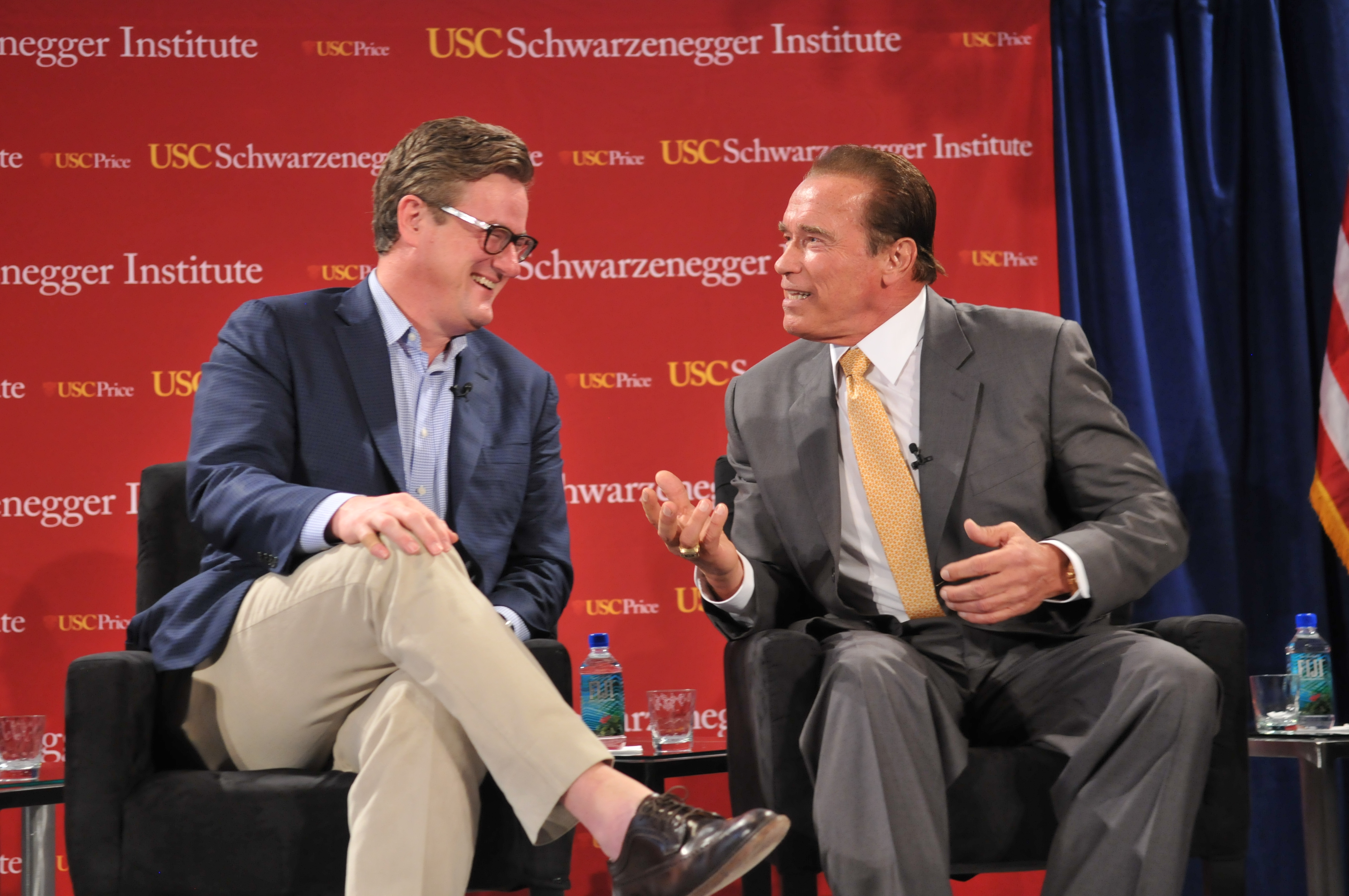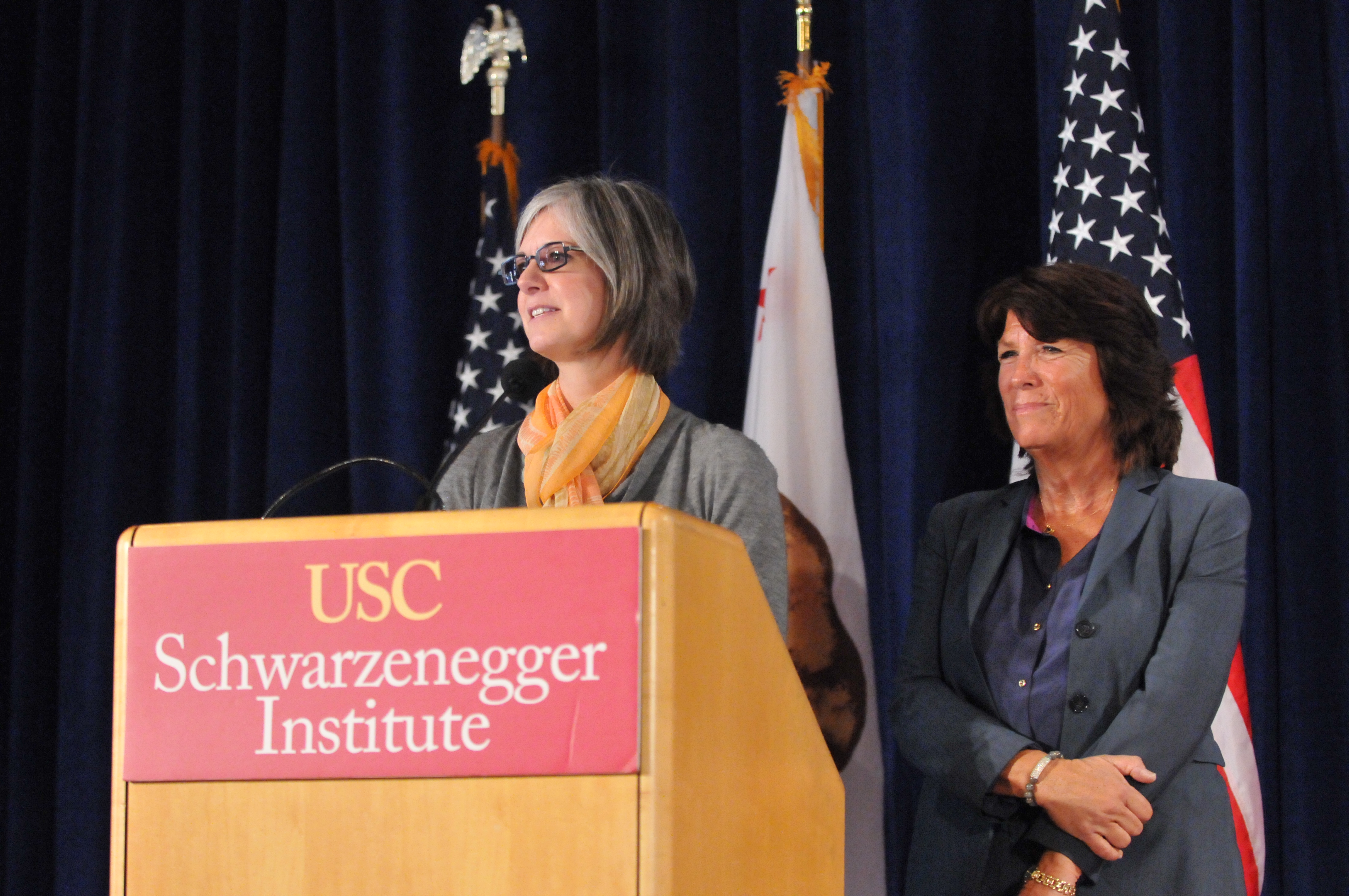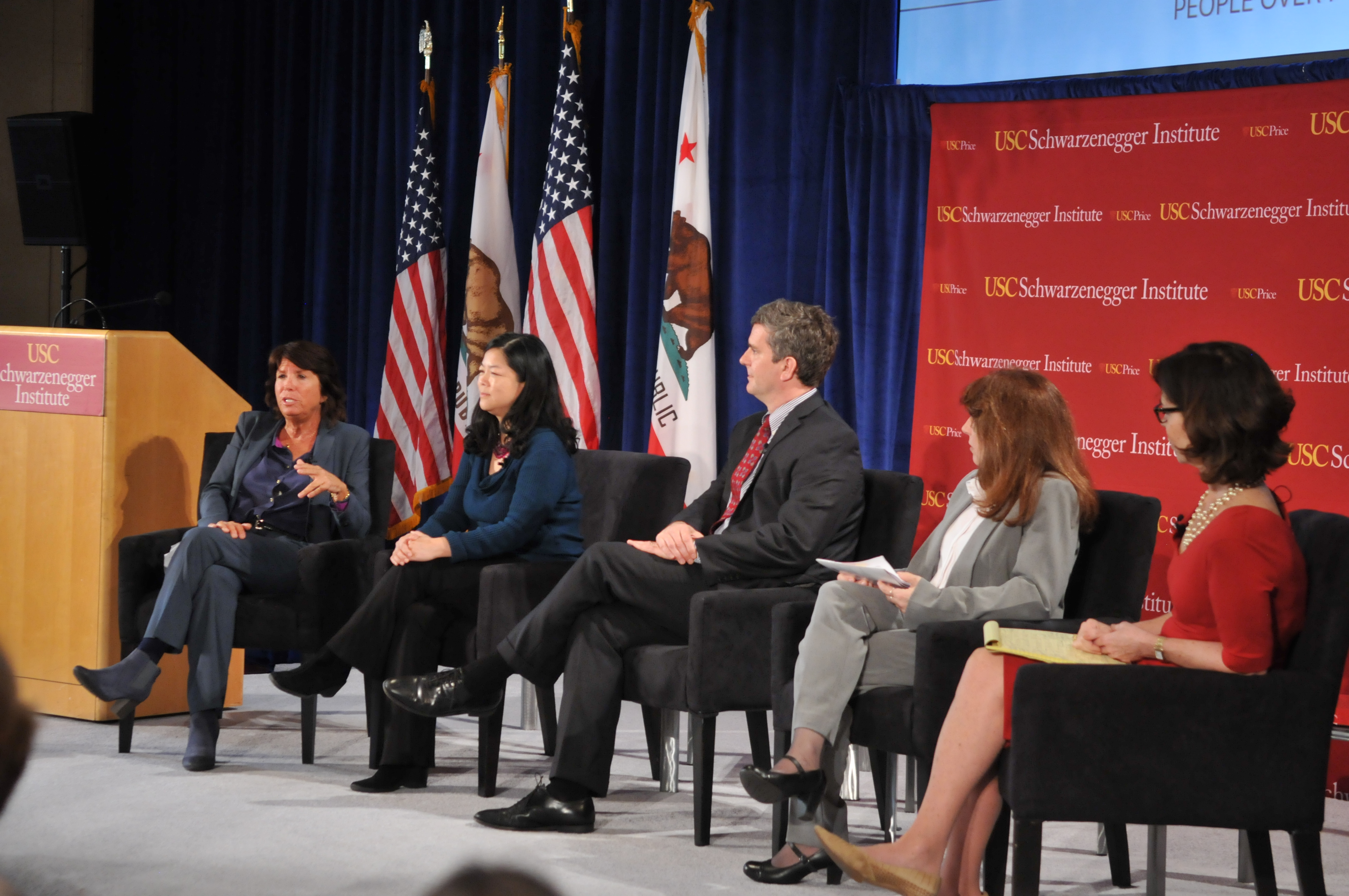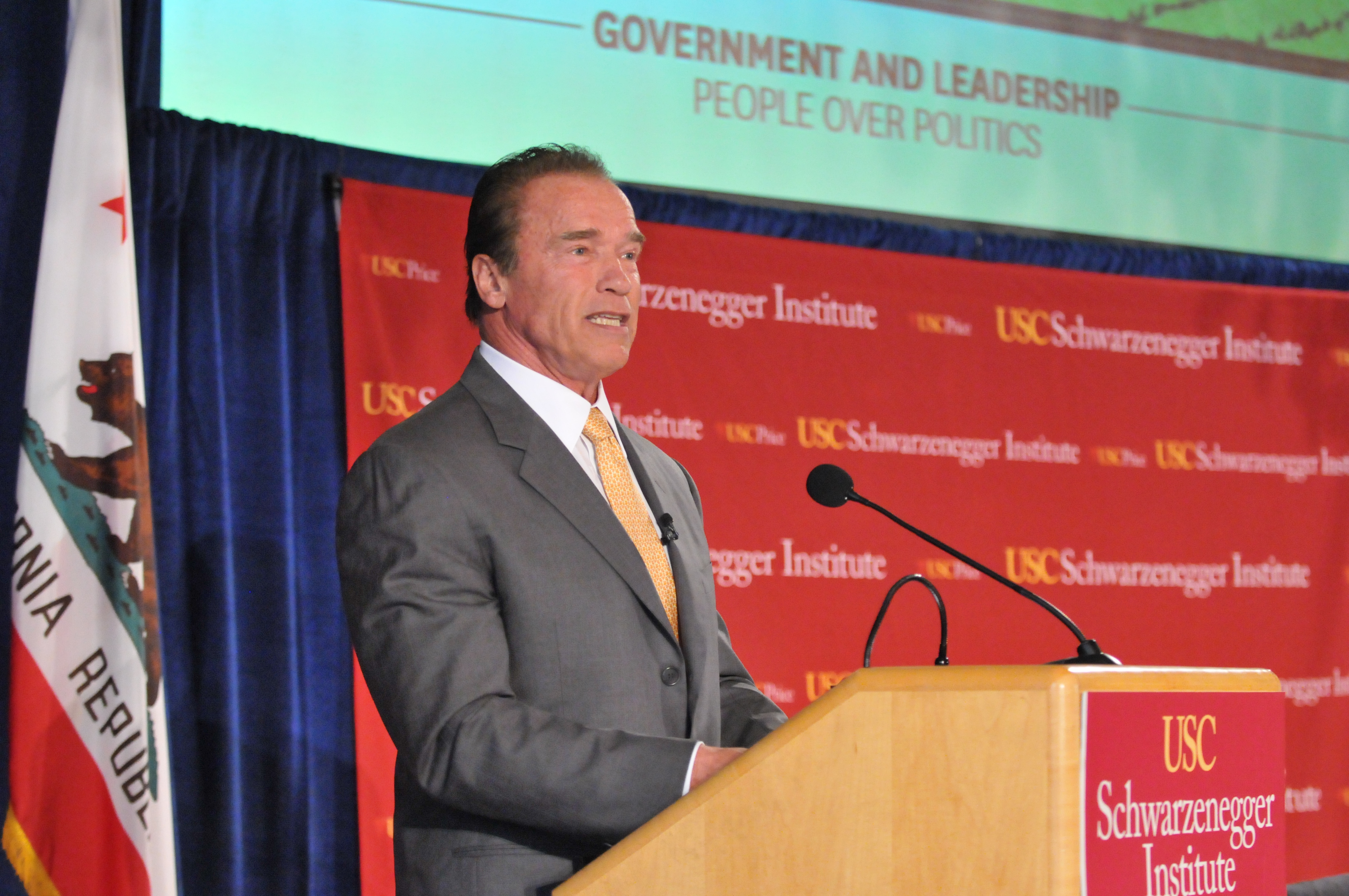By Nathaniel Haas
When asked what young people can do to fix their government in the face of crippling gridlock, Governor Arnold Schwarzenegger urged the crowd to look no further than the work of USC’s own students.
“I remember at USC in one of Nancy Staudt’s classes, the kids literally fought the City of Los Angeles who banned all murals, because they call it graffiti,” he said. “It was USC students, two of them, that went out and did all the research in the world…and eventually got the law changed after 10 years.”
The discussion took place as the USC Schwarzenegger Institute convened a symposium titled Government and Leadership: People Over Politics. The symposium featured two provocative conversations with advocates from across the political spectrum in support of a common goal: to fight political gridlock and make democracy work for the people. The symposium also featured a presentation by one of USC’s own faculty that reflected the Schwarzenegger Institute’s dedication to using research to inform public policy.
Nancy Staudt, a Professor of Law and Public Policy and the Academic director of the Schwarzenegger Institute, joined Bonnie Reiss, the Global Director of the Schwarzenegger Institute, in delivering the opening remarks.
“It is our core belief that our state and our nation are at their best when our leaders put what is best for the people over what is best for their own political interest and their own political parties,” Staudt said.
“We take seriously the first three words of the Constitution, “We the People,” Reiss said. “This was a priority of Arnold’s when he was governor, and his leadership and the leadership of a remarkable coalition of advocacy groups made possible the passing of significant political reforms in California.”
In his opening remarks, Governor Schwarzenegger, addressing the students, outlined why he and the institute are focused on political reform. As proof of the “rigged” political system he cited Congress’s 10 percent approval rating with their 90% re-election rate.
“Our political system has let you down: the voting statistics make this very clear,” Governor Schwarzenegger said to the students. “The sad fact is that for all of the politicians that always call you young people ‘the great hope’ for ‘the future,’ just a few of them are actually listening.”
Governor Schwarzenegger introduced Susan Kennedy, the moderator of the first panel and his chief of staff from 2006 to 2011. Kennedy moderated a conversation between Governor Schwarzenegger and MSNBC co-hosts of “Morning Joe” Mika Brzezinski and Joe Scarborough.
In a provocative discussion Kennedy said, “Gridlock isn’t new”, “in fact, it’s been around since the founding fathers designed our system of governance. I believe there are many who argue it was designed to cause a little bit of gridlock every now and again.”
Scarborough, a Congressman from 1995-2001 who recently published a book on the new strategy for the Republican Party titled “The Right Path,” was quick to point out that gridlock can be destructive. Scarborough expressed his belief that while leaders might have very different political ideologies they can still work together.
Scarborough cited the contentious but productive relationship between Ronald Reagan and then-Speaker of the House Tip O’Neil. He also cited the ability of the Gingrich-led Congress in the 1990’s (that he was a part of) to cooperate with Clinton in enacting welfare reform, regulatory reform, a balanced budget, and capital gains tax cuts.
The relationship between O’Neil and Reagan was highlighted in “Tip and the Gipper: When Politics Worked,” a book by MSNBC host and best selling author Chris Matthews. Mathews, who witnessed firsthand the productive relationship between the President and the Speaker in the 80’s as a senior aid to O’Neil, spoke about the importance of returning to that model at a Schwarzenegger Institute event held last fall.
For Brzezinski, the importance of relationship building was never more evident than growing up and watching her father, Zbigniew Brzezinski, serve as the National Security Advisor to President Carter. Zbigniew Brzezinski operated from the standpoint that he would rather hire people that challenged him, rather than “yes men” with whom he already agreed. For his young daughter, watching her father work with the likes of Robert Gates and Madeline Albright was a valuable political learning lesson.
Schwarzenegger stressed the importance of relationship building and how valuable this was when he was Governor. He credited this with helping get agreement on measures like pension reform and spending cuts, climate change, infrastructure investment, and the open primary ballot measure. Schwarzenegger talked about the many ways he engaged in relationship building. Whether he was inviting Democrat leaders to dinner, bringing them to Washington D.C. to meet with national leaders, or meeting with world leaders like Tony Blair to discuss environmental reform, Schwarzenegger spoke of the essential place that those relationships played in moving politics forward—and for proof, he pointed no farther than the front row.
“There is one guy that had a huge challenge: our mayor, Antonio Villaraigosa,” he said. “In order to make the City of Los Angeles successful, you had to work with Republicans and the business community.”
Villaraigosa agreed. Whether it was frequent meetings or late night phone calls, the duo recalled partnering to improve everything from education to infrastructure.
“We did have a great relationship, he said. “Both of us in our roles a chief executives had gotten tired of the ideologues.”
Ultimately, Schwarzenegger said the stalemate at the national level has gone on long enough.
The conversation also discussed two of the major steps California has taken to address gridlock and polarization in the State legislature.
Under Governor Schwarzenegger, California worked to end gerrymandering and established a citizens redistricting commission. California also created an open top two primary that eliminated the closed primary system. Did they work?
For that answer, the Schwarzenegger Institute turned to Christian Grose, Associate Professor of Political Science in the Dana and David Dornsife College of Letters, Arts and Sciences. Professor Grose studied the impact of both reforms on the polarization between parties and on the ideological extremes of members elected.
Grose’s results were twofold: post reform data showed the election of more moderates, and they also showed a closing of the gap between the two sides overall. Furthermore, when compared to national trends from 2011 onward, the polarization of the California legislature decreased, while the polarization of Congress increased.
Grose’s results laid the stage for the final panel of the symposium, which discussed the state of the political reform movement in America. Reiss, the moderator, was joined on the panel by Kathay Feng, a civil rights attorney and director of California Common Cause, John Fortier, Director of the Bipartisan Policy Center’s Democracy Project, Jackie Salit, the President of IndependentVoting.org, and Dorothy Siemon, the Vice President of Policy for AARP.
The panel discussed the many states that have active redistricting reforms underway and those that are looking at open primary reforms. The panel also discussed the other reforms being looked at in the U.S., including the recommendations of the Presidential Bi-Partisan Election Commission. Involving more voters in elections was an important topic, including moving to online registration and voting. Feng cited how after implementing online registration in California, 800,000 new voters registered in one month, and most of them were young people.
The panel concluded that the nation could benefit greatly from following California’s example. “The impact of what took place in California cannot be understated, Salit said. “It’s huge.”
Each panel examined the vital role that young people will play in bringing about an end to the gridlock. In the end, it was Governor Schwarzenegger who synthesized the advice from each discussion and encouraged students to paint their own mural of political change.
“You have the power to fight the status quo, and no one can take that away from you,” he said.






